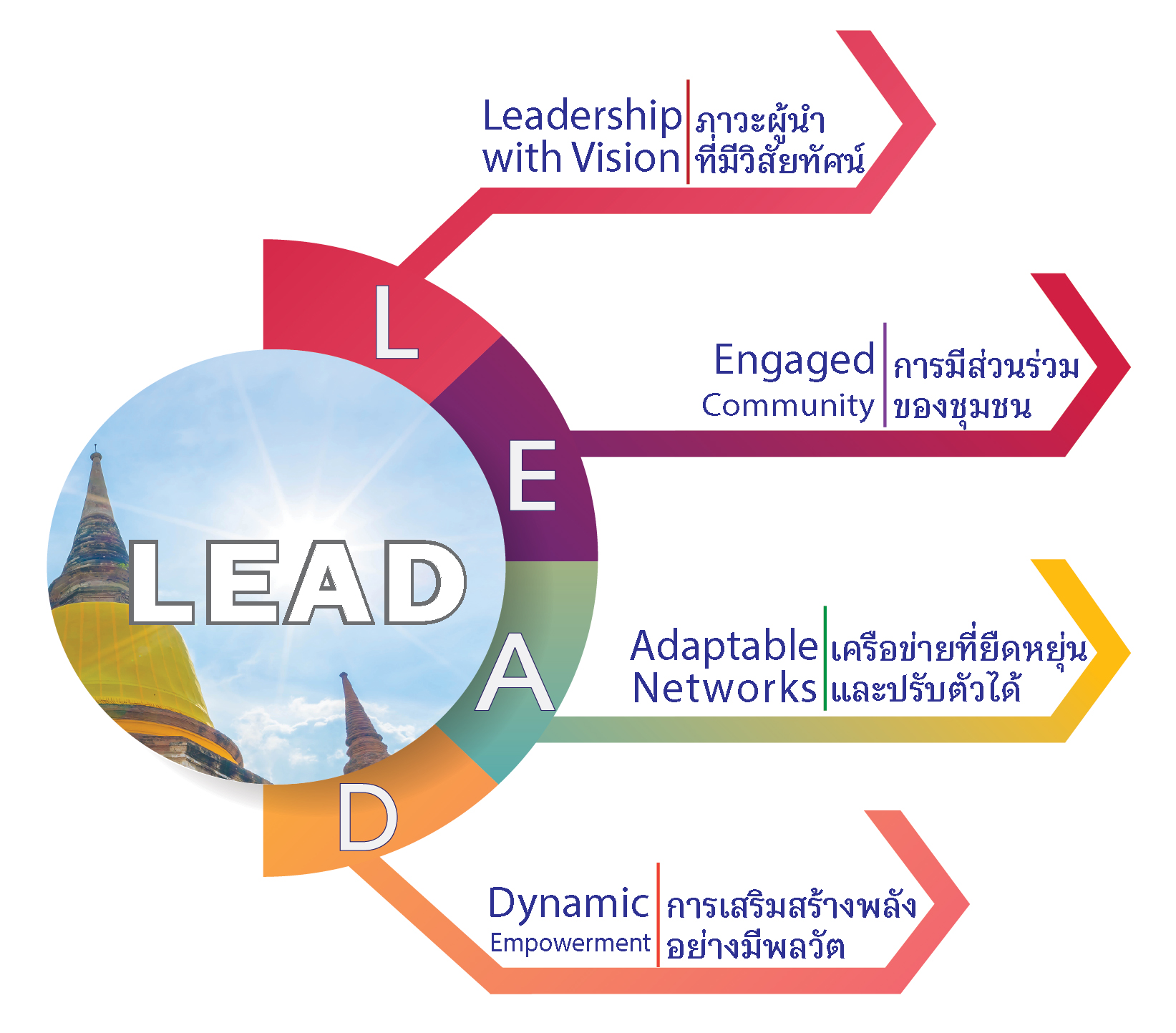The Integration of Theravada Buddhist Philosophy in Promoting Community Leaders in Roi Et Province
Main Article Content
Abstract
The purposes of this research were; 1) to study concepts and theories related to community leaders, 2) to study the principles of Theravada Buddhist philosophy relevant to promoting community leadership, 3) to integrate Theravada Buddhist philosophy to promoting community leaders in Roi Et province, and 4) to propose new knowledge on integrating Theravada Buddhist philosophy to promote community leadership in Roi Et province. This qualitative research gathers data from the study of the Tripitaka, Buddhist academic literature, and in-depth interviews with 15 key informants, including organizational leaders, Buddhist leaders, community leaders, and the public. The research findings are presented through analytical description.
The results revealed that:
1. Key concepts related to community leadership include leadership concepts, leadership theories, Path-Goal Theory, transformational leadership theory, and theories related to communities.
2. Theravada Buddhist principles relevant to promoting community leadership include: 1) Papanikadhamma, which encourages leaders to have a broad and detailed vision, allowing for far-sightedness; 2) Sappurisa-dhamma, which promotes comprehensive analysis and understanding of the community; and 3) Saraniya-dhamma, which fosters unity and builds positive relationships among community members.
3. The integration of Theravada Buddhist philosophy in promoting community leadership encompasses three key aspects: 1) Cakkhuma (far-sighted wisdom), which encourages community leaders to exercise prudence and strategic, reason-based thinking; 2) Parisannuta, which promotes leaders’ deep understanding of the community and empathy toward the people connected with it; and 3) Mettakaya-kamma (acts of kindness), which encourages leaders to show generosity through actions, speech, and thought, including sharing resources beneficial to the collective. This integration leads to the development of visionary community leaders who understand their community and can build strong networks for sustainable community development.
4. The new knowledge derived from integrating Theravada Buddhist principles to promote community leadership is represented by the LEAD Model, which consists of: 1) L = Leadership with Vision, aligned with Papanikadhamma, emphasizing foresight and prudent decision-making; 2) E = Engaged Community, corresponding to Sappurisa-dhamma, focusing on understanding the community and comprehensively analyzing issues; 3) A = Adaptable Networks, consistent with Saraniya-dhamma, highlighting unity and collaboration within the community; 4) D = Dynamic Empowerment, which promotes skill development and the empowerment of community members.
Article Details

This work is licensed under a Creative Commons Attribution-NonCommercial-NoDerivatives 4.0 International License.
เพื่อให้เป็นไปตามกฎหมายลิขสิทธิ์ ผู้นิพนธ์ทุกท่านต้องลงลายมือชื่อในแบบฟอร์มใบมอบลิขสิทธิ์บทความ ให้แก่วารสารฯ พร้อมกับบทความต้นฉบับที่ได้แก้ไขครั้งสุดท้าย นอกจากนี้ ผู้นิพนธ์ทุกท่านต้องยืนยันว่าบทความ ต้นฉบับที่ส่งมาตีพิมพ์นั้น ได้ส่งมาตีพิมพ์เฉพาะในวารสาร วิชาการธรรม ทรรศน์ เพียงแห่งเดียวเท่านั้น หากมีการใช้ ภาพหรือตารางของผู้นิพนธ์อื่นที่ปรากฏในสิ่งตีพิมพ์อื่นมาแล้ว ผู้นิพนธ์ต้องขออนุญาตเจ้าของลิขสิทธิ์ก่อน พร้อมทั้ง แสดงหนังสือที่ได้รับการยินยอมต่อบรรณาธิการ ก่อนที่บทความจะได้รับการตีพิมพ์References
เกรียงศักดิ์ เจริญวงศ์ศักดิ์. (2558). อารยมหาพลัง พลานุภาพผู้นำ: พลังเคลื่อนปวงประชาสู่ความอารยะ. กรุงเทพฯ: ซัคเซส มีเดีย.
ทนง ทศไกร. (2561). กลยุทธ์การพัฒนาภาวนะผู้นำของผู้บริหารโรงเรียนประถมศึกษาตามหลักทุติปาปณิกสูตรในสำนักงานเขตพื้นที่การศึกษาประถมศึกษานครสวรรค์ เขต 1. (ดุษฎีนิพนธ์พุทธศาสตรดุษฎีบัณฑิต). พระนครศรีอยุธยา: มหาวิทยาลัยจุฬาลงกรณราชวิทยาลัย.
พระโกศล มณิรตนา. (2560). รูปแบบการพัฒนาภาวะผู้นำทางการบริหารเชิงพุทธของผู้บริหารมหาวิทยาลัยมหาจุฬาลงกรณราชวิทยาลัยภาคเหนือตอนล่าง. (ดุษฎีนิพนธ์พุทธศาสตรดุษฎีบัณฑิต). พระนครศรีอยุธยา: มหาวิทยาลัยจุฬาลงกรณราชวิทยาลัย.
พระครูอุดมธรรมวัตร (มัจฉา ขนฺติโก). (2562). รูปแบบการพัฒนาผู้นำตามแนวพระพุทธศาสนาจังหวัดอำนาจเจริญ. (ดุษฎีนิพนธ์พุทธศาสตรดุษฎีบัณฑิต). พระนครศรีอยุธยา: มหาวิทยาลัยจุฬาลงกรณราชวิทยาลัย.
พระพรหมคุณาภรณ์. (ป.อ.ปยุตโต). (2549). ภาวะผู้นำ. (พิมพ์ครั้งที่ 9). กรุงเทพฯ: ธรรทาน.
มหาจุฬาลงกรณราชวิทยาลัย. (2535). พระไตรปิฎกภาษาไทย ฉบับสังคายนาในพระบรมราชูปถัมภ์. กรุงเทพฯ: มหาจุฬาลงกรณราชวิทยาลัย.
วรเศรษฐ์ ดอกบัว. (2564). หลักพุทธรรมเพื่อการเสริมสร้างความสามัคคีในการทำงาน. วารสารพุทธจิตวิทยา, 6(1), 1-8.
สนธยา พลศรี. (2547). ทฤษฎีและหลักการพัฒนาชุมชน. (พิมพ์ครั้งที่ 5). กรุงเทพฯ: โอเดียนสโตร์.
สำนักงานจังหวัดร้อยเอ็ด กลุ่มงานยุทธศาสตร์. (2567). แผนพัฒนาจังหวัดร้อยเอ็ด (พ.ศ. 2566-2570). ร้อยเอ็ด: สำนักงานจังหวัดร้อยเอ็ด กลุ่มงานยุทธศาสตร์และข้อมูลเพื่อการพัฒนาจังหวัด.

